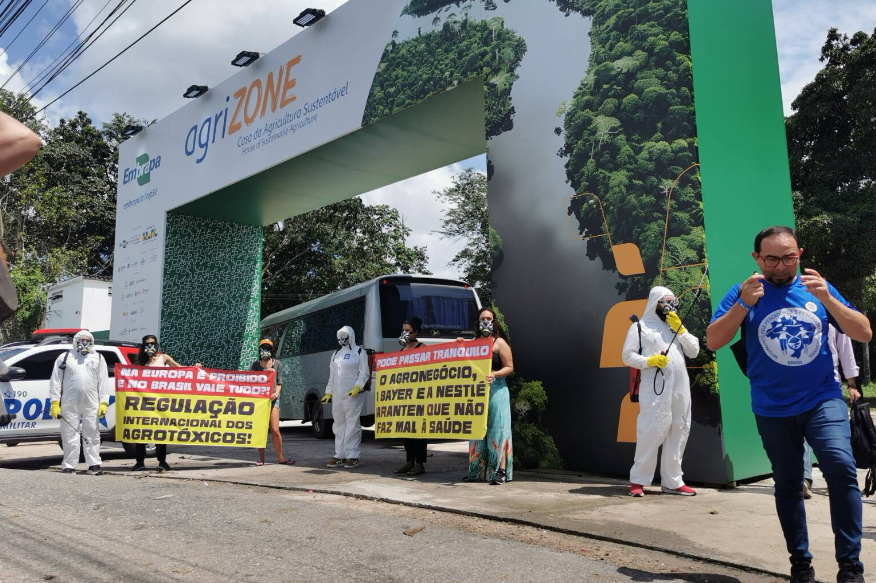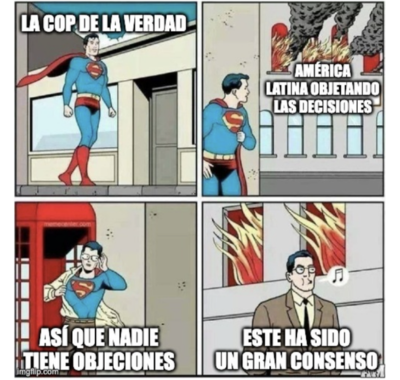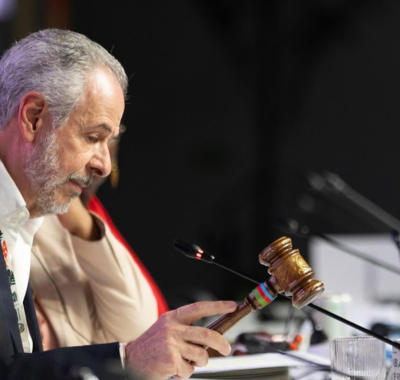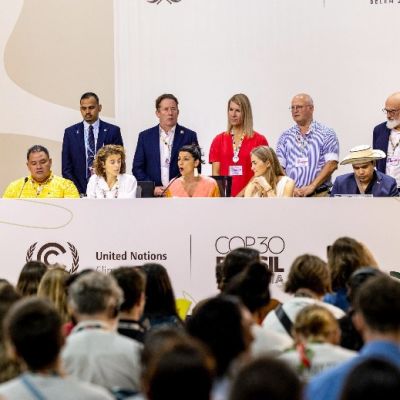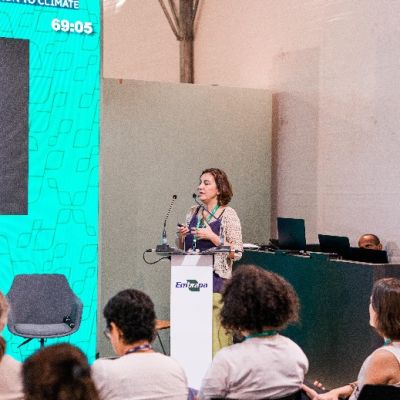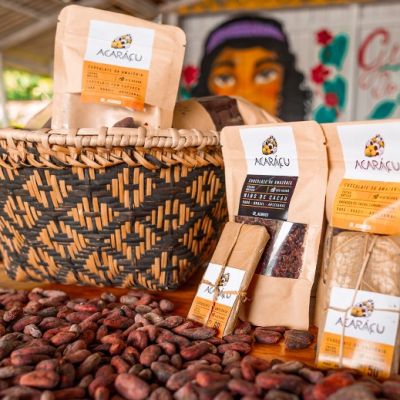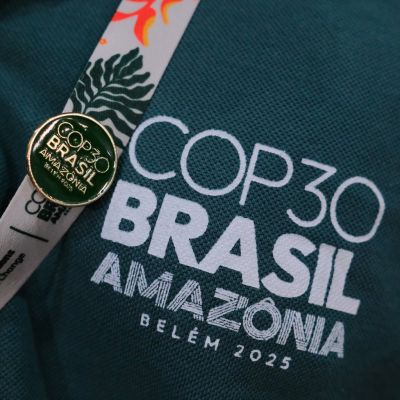Targets of protests, Bayer and Nestlé bring sustainability discourse to COP30
Food and pesticide giants — such as Bayer, Nestlé and PepsiCo — have been using the UN climate conference to promote messages about health and sustainability; this Thursday (20), companies are the target of protests at Agrizone.
By Hélen Freitas | Photo by Fernando Martinho
Translated by Diego Lopes/Verso Tradutores
FROM BELÉM — Multinational companies Bayer and Nestlé are the target of a protest organized by environmentalists this Thursday morning (20) at Agrizone, a space dedicated to agribusiness at COP30. The act denounces contamination by pesticides in the Brazilian Cerrado.
Food and agrochemical giants — such as Bayer, Nestlé, and PepsiCo — have been using the UN (United Nations) climate conference to promote messages about health and sustainability.
“We need to make food more accessible to everyone,” said Suelma Rosa, vice president of PepsiCo for Latin America, during a panel on Saturday (15). Four days earlier, a representative from Nestlé followed a similar line of reasoning in another debate.
Corporate rhetoric is criticized by civil society organizations. “The main motivation behind these discourses is not sustainability or health, but rather corporate survival and financial obligation,” argues Paula Johns, executive director of ACT Promoção da Saúde. In her assessment, these corporations “don’t sell real food.”
In a report on its activities in 2024, Nestlé Switzerland states that it provided 132 billion servings of affordable micronutrient-fortified foods, such as infant cereals. “Supporting newborns and infants is crucial to laying the foundation for healthy growth and development,” the publication says.
The document also explains that nutrient-rich foods are vital during early childhood. “Small stomachs have difficulty accommodating large volumes of food; therefore, fortified infant cereals and milk formulas play a key role in providing essential nutrients such as iron,” the report continues.
Aimed at children, products like Mucilon have sugar as their second main ingredient, after flour. Furthermore, they are highly processed, especially for children six months and older.
The characteristics of these products are inconsistent with the guidelines of the Dietary Guidelines for the Brazilian Population, from the Ministry of Health, which recommends unprocessed or minimally processed foods for babies.
Scientific studies link the consumption of ultra-processed foods — such as filled cookies, packaged snacks, and boxed juices — to 57,000 premature deaths per year in Brazil and to the development of 32 non-communicable chronic diseases (NCDs), such as cancer, diabetes, and obesity. The food guide recommends that the population avoid consuming ultra-processed foods, prioritizing real food.
A leader in pesticide production, Bayer is also at the UN conference
The German multinational Bayer is also present at COP30. “That’s why we say: health for all, hunger for none,” stated Felipe Albuquerque, the company’s sustainability director, citing the company’s slogan at a COP30 panel.
Bayer is one of the world leaders in the sale of pesticides, including Roundup, a product made from glyphosate. Widely used to control weeds in crops, the substance is considered “probably carcinogenic” to humans by the IARC, an agency linked to the WHO (World Health Organization). Some regulatory agencies, such as Anvisa (Brazil) and the EPA (United States), do not consider the product harmful, provided it is applied correctly.
Glyphosate is the subject of more than a thousand lawsuits in Brazil for health damage to workers and communities neighboring plantations, according to a survey by Repórter Brasil. Although Bayer is only involved in six lawsuits in the country (0.6% of the total), in the United States the company has already spent more than 11 billion dollars (R$ 59 billion) to settle approximately 100,000 lawsuits related to glyphosate. Another 61,000 are pending resolution.
For Paula Johns, Bayer’s discourse at COP30 is contradictory, “First, they sell pesticides and then they sell medicines,” she criticizes.
The FAO (Food and Agriculture Organization of the United Nations) points out that the current food system, based on the intensive use of pesticides and the production of ultra-processed foods, is driving a global epidemic of diseases.
According to the UN agency, the hidden costs already amount to approximately $12 trillion globally. Of this total, 70% of the costs are attributed to health problems caused by the consumption of ultra-processed foods.
Plastic pollution is also associated with the food industry
Present at COP30, PepsiCo and Nestlé, along with 200 other companies, are part of the Business Coalition for a Global Plastics Treaty. This initiative advocates for the concept of a “circular economy,” which includes the reuse and recycling of plastics, but without restricting the manufacture of this material.
The issue of plastic pollution is not being debated at COP30. A global treaty spearheaded by the UN is being discussed by hundreds of countries, without consensus so far.
In 2023, the organization Break Free From Plastic pointed out that, of the ten companies that pollute the most with plastic, seven were manufacturers of ultra-processed food and beverages. Among the top three were Coca-Cola, PepsiCo, and Nestlé.
“We need to finalize the plastics treaty as soon as possible, with ambitious goals,” stated PepsiCo Vice President Suelma Rosa. During the panel discussion, she also defended the use of the material, asserting it as one of the best solutions for food safety.
“Calling on these companies to be the solution to food problems is like calling a thief to guard your house. They are profiting from a model that is neither good for health nor for the environment,” concludes Paula Johns.
This report was produced by Repórter Brasil, through the Collaborative Socio-environmental Coverage of COP 30. Read the original report at https://reporterbrasil.org.br/2025/11/alvos-protestos-bayer-nestle-discurso-sustentabilidade-cop30/

